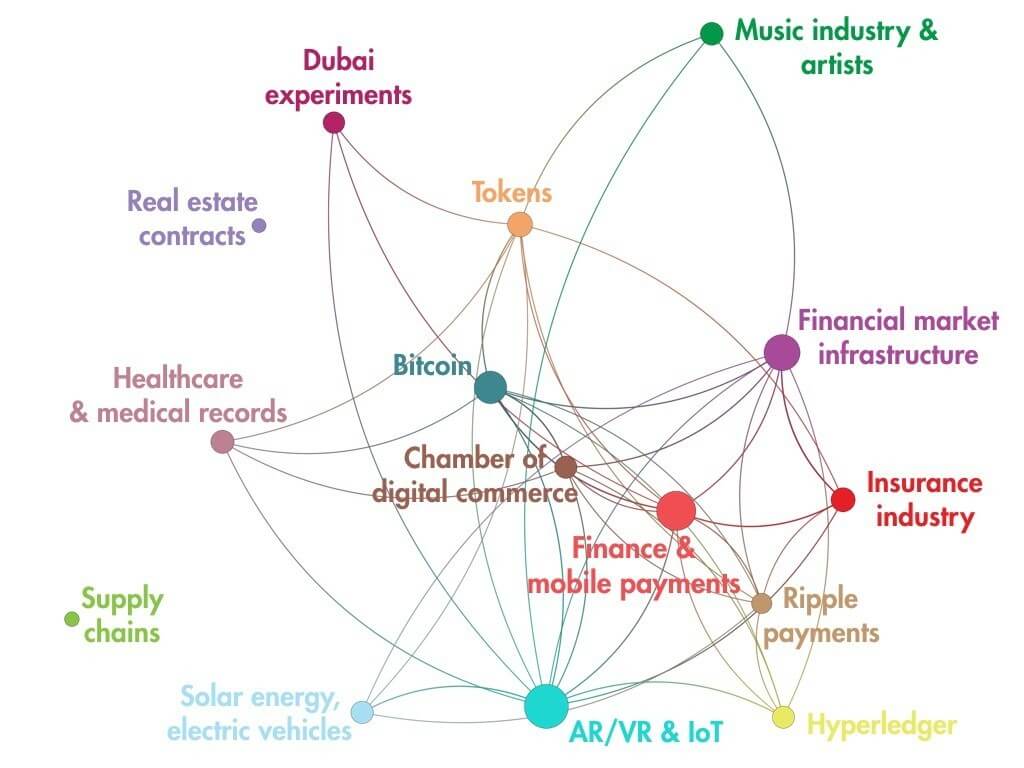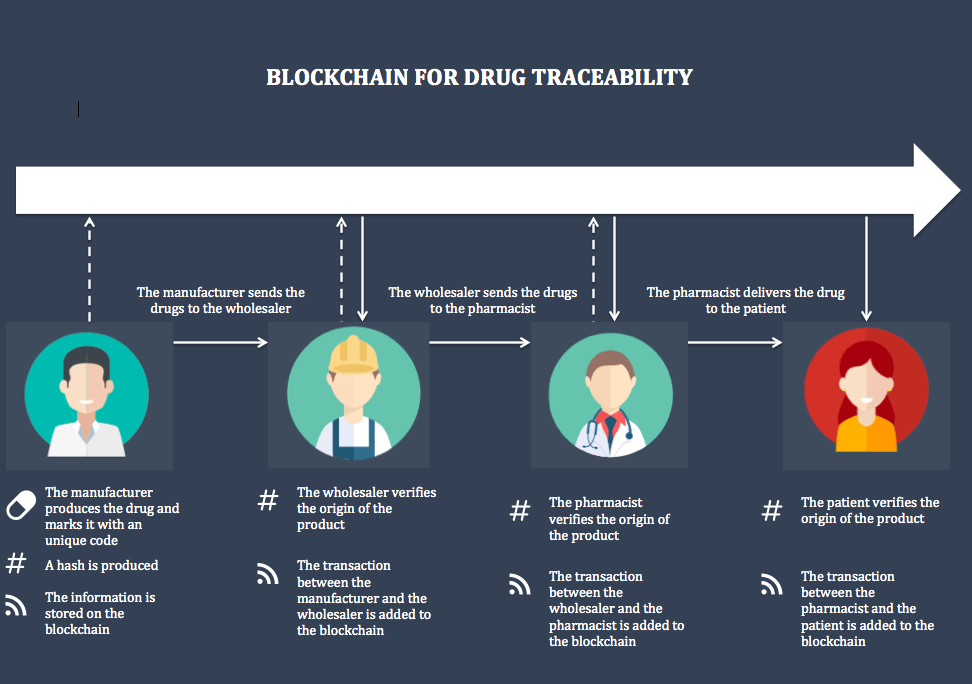There are many industries Blockchain will disrupt. Blockchain will transform industry in a similar way to the internet. The blockchain will revolutionise supply chains, cut out intermediaries, provide greater transparency and enable distributed data mining. Many experts predict that blockchain technology will be the most disruptive technology since the creation of the internet. The financial industry is already being transformed by the blockchain technology. The blockchain technologies offer improvements in operational efficiencies, cost reduction in transactions and reduced risk. There are lots of industries blockchain will disrupt. This article takes a view of some of them.
The blockchain leverages the resources of a global peer-to-peer network to ensure the integrity of the value exchanged among billions of devices without going through a trusted third party. Unlike the internet alone, blockchains are distributed, not centralised; open, not hidden; inclusive, not exclusive; immutable, not alterable; and secure.
Blockchain, or distributed ledger system (DLS), could soon give rise to a new era of the Internet even more disruptive and transformative than the current one. Industries are now beginning to recognise the benefit of the Distributed Ledger System (DLS) that the blockchain offers.

A Quid network shows 1,675 stories about the future of blockchain, from global news sources between 20 April 2016 and 20 April 2017. Many of these stories show the growing interest in industries outside of financial markets.
Like the Internet, the blockchain is an open, global infrastructure upon which other technologies and applications can be built. It allows people to bypass traditional intermediaries in their dealings with each other, thereby lowering or even eliminating transaction costs.
Industries Blockchain Will Disrupt
These are just some examples of how the blockchain will disrupt the underlying business models of many industries.
Industries Blockchain Will Disrupt – #1. Transport

The transportation industry will be disrupted by blockchain in two ways:
- the development of in-car eWallets.
- the rise of blockchain-based de-centralised peer-to-peer ride sharing services.
#1. In-Car eWallets
UBS, ZF and innogy are currently developing an eWallet that will allow future car owners to automatically pay for services such as highway tolls, parking and electricity top-ups using the cars built-in, blockchain-based electronic wallet.
Essentially we will be entering the era of subscriptions and micro-transactions. Micro transactions are micro payments between devices or wallets that provide either people of businesses with services.
#2. Ride Sharing
Ride sharing services will likely increase as part of the growing sharing economy. Basing rideshare services on blockchain technology dis-intermediates the centralised third party service providers. Both car users and owners can arrange the terms and conditions of the ride share via secure, blockchain-based smart contracts. Startups currently developing such services include New Hampshire-based Arcade City and Israel-based La Zooz.
Industries Blockchain Will Disrupt – #2. HealthCare

In recent study, the IBM Institute for Business Values indicated that 16 percent of healthcare institutions are expect to have a commercial blockchain solution at scale in 2017.
From the study, 70% of theTrailblazers identify three areas as the greatest potential to realise benefit from blockchain technology:
- Clinical trials data (transparency and updated records)
- Regulatory compliance
- Medical and healthcare records
Blockchain uniquely benefit clinical trials as transparently recording data can increase trust for patients and doctors. This can dissuade those who selectively report outcomes from clinical trials.
The healthcare industry currently suffers from data that is stuck in legacy systems and often not securely stored, which has led to cyber attacks due to their weak technical infrastructure. Implementing the blockchain technology will lead to safely store and share data with patients and authorised healthcare professionals. Startups that are working on disrupting the current status quo in the healthcare data space are California-based Gem and Connecticut-based Tierion.
The opening up of access to large sets of data would also provide new ways to explore provide better services to those that need it. Another trend that fits in with Healthcare is the use of smart devices (IoT devices). By the year 2020, it is predicted that IoT inventions will result in a digital healthcare market of $117 billion, bringing to the table a plethora of inventions that will revolutionise the industry and save millions of dollars.
Patients will soon be able to use advanced wearable devices solely for at-home use that automatically sends data to a healthcare provider These devices will be systematically updated and linked to blockchain technology to store records and data recorded for analysis.
A further opportunity would be the management of inventory which is vital to the functioning of a hospital. Inventory control would be completely transformed by the IoT and blockchain. Medications and a host of assets could be tracked. Healthcare is one of the industries blockchain will disrupt.
Industries Blockchain Will Disrupt – #3. Cyber Security

Cyber security has become an increasingly hot topic for both individuals and corporations as the number of cyber crime cases increases globally. In fact, the World Economic Forum highlighted cyber crime as one of the key risks the world is facing today.
Due to its decentralized and immutable nature, blockchain can be used to prevent data theft, storing data in a safe and secure manner using cryptography.
Furthermore, the blockchain can be used to build a more robust and secure internet that is less prone to DDoS (Distributed Denial of Service) attacks, which can take entire websites offline. Blockchain startup Nebulis is currently developing a new blockchain-based internet Domain Name System, which due to its decentralized nature cannot be affected by DDoS attacks and, thereby, creates a better internet.
Industries Blockchain Will Disrupt – #4. Music Industry

Our vision for the problem with attribution is a shared data layer, which is key to solving attribution, empowering creators and rights owners, and enabling a more efficient and sustainable model for creativity online.
Mediachain
The music industry is worth $15 Billion, which leaves a lot of scope for scaling new and innovative solutions. Other startups leveraging blockchain to change how music will be distributed and shared and how royalties will be paid. Startups Peertracks, Ujo Music and Mycelia are building blockchain-based solutions for artists to directly sell their music to fans without the need for a record label or third-party distributor, creating a fairer music industry in which artists are directly remunerated for their work and able to develop closer relationships with their listeners.
Industries Blockchain Will Disrupt – #5. Supply Chain Management
One of the largest industries Blockchain will disrupt is the transportation of goods – in other words supply chains. There are numerous startups building blockchain solutions for supply chain management, including UK-based Provenance, California-based Skuchain and New York-based Hijro.
The blockchain supply chain will consist of Internet Of Things sensors and the blockchain to register and keep records of transactions. Essentially you will have a constantly updating system that:
- provides in near real-time the whereabouts of goods
- makes payments and receives payments as goods pass through points in the supply chain e.g. customs
- provides a complete picture of supply and demand (when tied in with sales data)

Industries Blockchain Will Disrupt – #6.Cloud Storage

Companies that offer cloud storage services store their customer’s data in centralised servers, which are vulnerable to breaches and data loss due to operational or human errors. On the other hand, cloud storage solutions that incorporate blockchain technology are less exposed to attacks that may cause system outages or loss of data.
Storj is an example of a blockchain based, end-to-end encrypted, cloud storage network that is secure and cheaper for cloud-based transactions. Users on the Storj network are also able to rent out any remaining digital storage space to other parties for a fee. Hence, opening up a new market for crowdsourced cloud storage. Other blockchain-based projects in this sector include Siacoin and Filecoin, which both work on similar principals as Stroj.
Industries Blockchain Will Disrupt – #7. Insurance

The insurance industry is still heavily reliant on paper, multiple intermediaries and manual hand-offs, it is staggering to think that the insurance industry accounts for around 6% of global GDP, yet has such high levels of operational inefficiency.
There are a handful of tech companies out there that pcarving out new and innovative ways to reinvent the insurance industry. Etherisc (etherisc.com), an Insurtech startup, aims to make the purchase and sale of insurance more efficient, enable lower operational costs, provide greater transparency to the insurance industry, and democratize access to reinsurance investments.
Another, blockchain startup offers a solution in the form of LenderBot.LenderBot allows you to enroll in customised micro-insurance via live chats on Facebook Messenger. The aim is to provide a cover for high-value items exchanged between individuals with the blockchain acting as a third party in the agreement. This is a micro-insurance proof of concept for the sharing economy developed by blockchain startup, Stratumn, in partnership with Deloitte and payment services company Lemonway.
Even more established companies are making changes and testing the opportunities of using the blockchain. AIG has teamed with IBM to use blockchain for ‘smart’ insurance policy.
Industries Blockchain Will Disrupt – #8. Real Estate

Real estate is one of the many industries that are expected to make great use of blockchain. There are three advantages of blockchain for the real estate industry:
- Transparency
Information asymmetry belongs to the past with blockchain and a level playing field is created. All data necessary for a transaction is stored in the database and is easily accessible for the buyer and seller of real estate. Relevant information about prices of comparable objects is available for everyone and not only for a few person or at a high price. The entire transaction history of the property could then be followed through the blockchain. This reduces the need of a middlemen or due diligence will disappear when this technology is adopted within the marketplace. - Removing the risk of fraud
With a total transparent system of real estate ownership and the possibility to track down the transaction history of each property in the market the risk of fraud becomes less. Each year a lot of money is involved with the verification of ownerships, rights and titles transfers. - Speeding up the process associated with buying or selling a property
Blockchain will use smart contracts. Using smart contracts based on blockchain, assets exchange could follow specific instructions encoded as part of transaction to be executed automatically once agreed criteria have been met. All the computers of the participants in the network validate every transaction.
Propy is currently available in Dubai, New York, San Francisco, Los Angeles, Miami and Moscow. In these cities, consumers can purchase real estate properties by establishing a connection with a real estate broker on a Blockchain-based platform. REIDAO is set to create the first digital assets that are backed by real estates. REIDAO is tokenising real estates on the Ethereum Blockchain. Citiesense is the most recent one we have discovered, currently in beta stage while it fine tunes its New York city focused platform. Citiesense is establishing a Neighbourhood Knowledge Platform™, enabling cities to organise fresh information for the real estate industry, from the neighbourhood up, and drive development toward the best outcomes.
There are many other industries that will be transformed as result of the blockchain.



